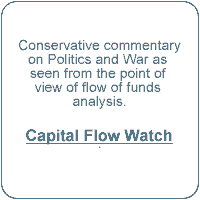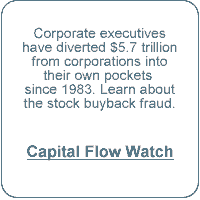 Public Servants, Bureaucrats, and Entrepreneurs
Public Servants, Bureaucrats, and Entrepreneurs
Workers' Capitalism and Entrepreneurs
An Entrenched Elite Class
At the highest level of American society – Congress, the judiciary, the federal bureaucracy, and the universities – office-holders have long ago manipulated the rules and ensured themselves virtual lifetime employment, if they so wish.
Favored office-holders ensure themselves of virtual lifetime employment.
Gerrymandered districts, congressional seniority, election laws favoring incumbents, civil service regulations, and tenured professorships (funded by tax deductible contributions, government research projects, and guaranteed student loans) shield millions of privileged Americans in high position from the economic realities that are faced by entrepreneurs and small business men and women.
'Rational Man' Is A Bureaucrat
Whereas seventy years ago public servants were truly underpaid, this is no longer the case.
In 1991, the average federal government employee (non-military) earned $46,789 a year – forty-seven percent more than the average private employee.
In addition, government employees have more liberal fringe benefits than fellow citizens in equivalent jobs in the private sector:
- paid vacations and holidays,
- exemptions from certain state and federal taxes,
- regular annual increases not linked to the economic cycle,
- lower productivity standards,
- paid personal time off,
- allowances for sick days,
- shorter work hours,
- generous severance pay,
- early retirement,
- unused sick leave credit,
- high-level defined-benefits retirement programs,
- routine increases in pension benefits, and
- paid health care on retirement.
Government employees have more liberal benefits than citizens in the private sector
The Cards Are Stacked
Perhaps the clearest evidence of prejudice against small business and entrepreneurial activity can be seen in the income tax system.
The majority of Americans, as employees, are shielded from the most troublesome aspects of the income tax system.
The system which is widely touted as being 'fair' is, in fact, blatantly discriminatory.
Essentially, the groups with the most votes pay the least taxes.
People who both own and manage the businesses that create the jobs and income the drives the country forward make up less than five percent of the population.
Small business owners are now a feeble and unheard minority
Most of these businesses are too small, their owners too busy, and their tills too short of cash to exercise much power other than through their individual votes.
Consequently, small business owners are now a feeble and unheard minority.
Large businesses – generally run by employee-managers – have the funds and power to buy legislators and sway government administrators, but their interests have little in common with those of small business owners.
Of course there is always some entrepreneurial activity in every society (even in government bureaucracies), as we are reminded by the role of Sgt. Sefton (William Holden) in the 1953 movie, 'Stalag 17', or the operations of black marketeers in Soviet Russia.
Few Care about Equity Supply
The question for capital flow analysts is whether there will be enough entrepreneurs to deliver an ample supply of reasonably-priced equities to serve the needs of long-term investors.
The shortage of equities is likely to continue
The U.S. government pays virtually no attention to the question of adequate supply of equities.
The assumption is that the Invisible Hand of the market will automatically deliver fairly-priced securities in sufficient quantities to serve the needs of long-term savers.
Unless the government revises the income tax to favor small entrepreneurs and provides easy access of capital (instead of loans) to would-be business people, as occurred in the Homestead Act of 1862, it is likely that the shortage of equities will continue in the American market.
Before proceeding, check your progress:
Self-Test
The long-run supply of equities in the United States increases with:
|
|
The U.S. Small Business Administration has programs that provide:
|
|
The economic growth of the United States depends primarily upon:
|
 Democracy's Snare : continued >
Democracy's Snare : continued >

| 'The Protestant Ethic and the Spirit of Capitalism', Paperback, Max Weber, Talcott Parsons, Anthony Giddens This 1904 classic, portrays the morality of 19th century American capitalism, now long gone. |
| 'Origins and Destinies: Immigration, Race, and Ethnicity in America', Paperback, Silvia Pedrazza, Ruben Rumbaut
A useful text on the various waves of immigration to America. Essential background to understanding the evolution of American capitalism. |
| 'The Great Land Rush and the Making of the Modern World, 1650-1900', Hardcover, John C. Weaver
How the European expropriation of land in the New World affected nations and civilization. This essentially 'free capital' allowed two-thirds of Americans to be in business for themselves in the mid-nineteenth century. |
| 'New Venture Creation: Entrepreneurship for the 21st Century with Powerweb and New Business Mentor CD', Paperback, Jeffry Timmons, Stephen Spinelli
A text book with case studies in starting new ventures by the inventor of the term 'Post-Brontasaurus Capitalism' |
| 'Creating Modern Capitalism: How Entrepreneurs, Companies, and Countries Triumphed in Three Industrial Revolutions', Paperback, Thomas K. McCraw
A collection of articles about business success over the centuries. |
| 'Violent Entrepreneurs: The Use of Force in the Making of Russian Capitalism', Paperback, Vadim Volkov
A well-documented study of Russian capitalism in the 1990s shows what happens when Adam Smith is applied without the ethical component. |
| 'Obscene Profits: The Entrepreneurs of Pornography in the Cyber Age', Paperback, Frederick S. Lane III
Sixty thousand adult web sites have a larger share of the entertainment industry than sporting events and live music performances together. So far, however, these businesses have not contributed much to the supply of equities. |
| 'Startup.com', DVD, Kaleil Isaza Tuzman
A remarkable real-life documentary of the rise and fall of a dot com venture during the 1990s. Highly recommended. |
| 'Meltdown on Main Street: Why Small Business Is Leading the Revolution Against Big Government', Hardcover, Richard Lesher, Newt Gingrich
The case against big government that helped put Republicans in control of Congress in 1994. |
| 'The Myth of the Robber Barons', Paperback, Burton W. Folsom
This is one of those books that the liberal establishment hopes you never read. Terrific! |
| 'Millionaire Women Next Door: The Many Journeys of Successful American Businesswomen', Hardcover, Thomas J. Stanley
A thoroughly researched study of successful, self-made American businesswomen. |
| 'The Anatomy of an Entrepreneur: Family, Culture, and Ethics', Hardcover, Joseph J. Jacobs
The autobiography of a successful, first-generation Lebanese-American businessman, stresses the importance of cultural and moral values. |
| 'The SBA Loan Book', Paperback, Charles H. Green
'How to get a small business loan, even with poor credit, weak collateral, and no experience.' |
| 'Stalag 17 (1953)', DVD, Best Oscar Actor: William Holden
Sgt Sefton (William Holden) displays selfish, entrepreneurial spirit, even in a German Prison Camp during WW II |
| 'Angel Investing: Matching Startup Funds with Startup Companies: A Guide for Entrepreneurs, Individual Investors, and Venture Capitalists'
The difference between Angels and Venture Capitalists and the world of Startup Finance. |
| 'Red Capitalists in China: The Party, Private Entrepreneurs, and Prospects for Political Change', Paperback, Bruce J. Dickson
The implications of recruiting entrepreneurs into the communist party. The idea of wedding capitalism with Big Government is not alien to the U.S. |
| 'Entrepreneurs in High Technology: Lessons from MIT and Beyond', Hardcover, Edward B. Roberts
A study of the high-tech companies that grew along Route 128 near Boston after WW II. |
| 'The Vital Few: The Entrepreneur and American Economic Progress', Paperback, Jonathon R. T. Hughes
A study of the entrepreneurs that helped to establish the character of American business and to carry the American economy forward from colonial times. |
| 'Half Luck and Half Brains: The Kemmons Wilson, Holiday Inn Story', Hardcover, Kemmons Wilson, Robert Kerr
The autobiography of a modern day Horatio Alger. |
| 'Brand New: How Entrepreneurs Earned Consumer's Trust From Wedgwood to Dell', Hardcover, Nancy F. Koehn
Biographies of six entrepreneurs over three centuries by a professor at the Harvard Business School |
| 'Kitchen Table Entrepreneurs: How Eleven Women Escaped Poverty and Became Their Own Bosses', Paperback, Martha Shirk, Anna S. Wadia
In the U.S., the number of women-owned companies is growing at twice the rate of all firms. |
| 'Mexican-American Odyssey: Felix Tijerina, Entrepreneur and Civic Leader, 1905-1965', Hardcover, Thomas H. Kreneck
Coming to Houston speaking no English, he built the Tex-Mex restaurant empire and turned his attention to the plight of his fellow Mexican-Americans. Highly inspirational! |

| Own A Share Of America : 'Program Asks For Believers To Own A Share Of America', Paul Chimera. Buffalo Business First. [Return] |
| National Commission on Entrepreneurship : The Public Forum Institute: National Dialogue on Entrepreneurship. [Return] |
| Kauffman Foundation : 'The Foundation of Entrepreneurship'. [Return] |
| Global Entrepreneurship Monitor : '2003 National Entrepreneurship Assessment United States of America', Ewing Marion Kauffman Foundation. [Return] |
| New Paradigm : 'A New Paradigm?', Federal Reserve Bank of San Francisco. October 10, 2020. [Return] |
| Jeffry Timmons : Professor of Entrepreneurship, Babson University. [Return] |
| Small Business Administration (SBA) : U.S. SBA website. [Return] |
| Reconstruction Finance Corporation : Article in the Fact Monster encyclopedia. [Return] |
| Herbert Hoover : Presidential Library and Museum. [Return] |
| Smaller War Plants Corporation : 'Records of the Smaller War Plants Corporation', U.S. National Archives and Records Administration. [Return] |
| Small Defense Plants Administration : 'Records of the Small Business Administration', U.S. National Archives and Records Administration. [Return] |
| Small Business Investment Company Act : 'SBA Regulation: 13 CFR Part 107: Small Business Investment Companies'. [Return] |
| Small Business Institute : 'Northwest Texas Small Business Development Center Region Group' [Return] |
| Regulatory Flexibility Act (RFA) : Title 5 of the United States Code, sections 601 – 612. [Return] |
| Small Business Regulatory Enforcement Fairness Act : P.L. 104-121 March 29, 2020 Title II--Small Business Regulatory Fairness. [Return] |
| Small Business Advocacy Review Panel Process : 'About Advocacy', SBA Office of Advocacy. [Return] |
| Homestead Act of 1862 : 'What Was The Homestead Act?', Homestead National Monument of America. [Return] |
| National Association of Gay and Lesbian Community Centers : 'Center Resources'. [Return] |
| Department of Labor : 'U.S. Department of Labor in the 21st Century'. [Return] |
| Department of Commerce : Website. [Return] |
| Intelligence Testing : 'Is Employment Testing Legal?', Employee Selection and Development, Inc. [Return] |
| Gerrymander : Encyclopedia article: Encarta. [Return] |
| Government Cost Review : 'The Excess Cost of Government Employment in the U.S.', The Public Purpose, Labor Market Reporter. [Return] |
| Invisible Hand : 'Adam Smith and the Invisible Hand', Helen Joyce, Plus Magazine. [Return] |

